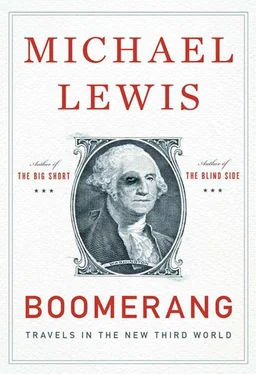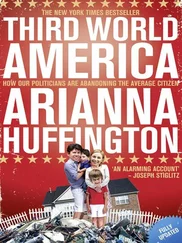The hope that California would generate the tax revenues needed to pay for even newly reduced services vanished. “This crisis consumed the last three years,” says Schwarzenegger. “All of a sudden you are pissing off everyone. The parks don’t get money and all of a sudden everyone is in love with parks. People pay attention so much to how does it affect them immediately: that’s just the way the human mind works.”
How the further degradation of public services affected people immediately would not have been immediately obvious to a governor sitting in Sacramento. As Meredith Whitney had pointed out, the state has great ability to paper over its financial problems by pushing them down to cities. In May 2011, to take just the most cinematic of countless examples, the U.S. Supreme Court upheld a ruling that California’s prison conditions constituted cruel and unusual punishment and violated the Eighth Amendment. The ruling ordered the state either to build more prisons or to release thirty thousand inmates. The state—still overpaying its prison guards—has chosen to release the prisoners and, with them, their social cost. There will probably be more crime, and heavier dependency on local public services, but it must be paid for by local communities. At some point in our talks I had asked Schwarzenegger how much time he had spent, as governor, grappling with the on-the-ground local implications of the big state crisis. The question pretty clearly bored him. “I’m not into the local stuff,” he’d said. “I was born for the world.”
ABOUT AN HOUR into the weekly meeting of the San Jose City Council I find myself wishing that I, too, was born for the world. A hundred citizens yawn and text as the council honors National Farmer’s Market Week; the few people who seemed to be paying attention get up and leave after the honor is bestowed. The council commemorates August 7 as Assyrian Martyrs Day, “honoring the massacre of three thousand people in August 1933, and recognizing 2,000 years of persecution of Assyrian Christians.” Maybe thirty people turn their attention from their cell phones to the ceremony but then they, too, rise and exit the chamber. A mere handful of people are left to hear the San Jose city manager offer the latest bleak financial news: the state of California was clawing back tens of millions of dollars more, and “one hundred and forty employees have been separated from the city.” (New times call for new euphemisms.) A pollster presents his finding that, no matter how the question is phrased, the citizens of San Jose are unlikely to approve any ballot measure that raises taxes. A numbers guy gets to his feet and explains that the investment returns in the city’s pension plan are not likely to be anything like as high as was assumed. In addition to there not being enough money in this particular pot to begin with, the pot is failing to expand as fast as everyone had hoped, and so the gap between what the city’s employees are entitled to and what will exist is even greater than previously imagined. The council then votes to postpone, for six weeks, a vote on whether to declare the city’s budget a “public emergency,” and thus to give to the mayor, Chuck Reed, new powers.
In between each motion an obese man not so much dressed as enshrouded in blue jean overalls maximizes his right to be heard for five minutes on every subject: over and again he rises from the front row of the audience, waddles to the podium, and delivers sophisticated-sounding but incomprehensible critiques of everything. “ The absolute reduction in competence of government is predicated on what happened today . . . ”
The relationship between the people and their money in California is such that you can pluck almost any city at random and enter a crisis. San Jose has the highest per capita income of any city in the United States, after New York. It has the highest credit rating of any city in California with a population over 250,000. It is one of the few cities in America with a triple-A rating from Moody’s and Standard & Poor’s, but only because its bondholders have the power to compel the city to levy a tax on property owners to pay off the bonds. The city itself is not all that far from being bankrupt.
It’s late afternoon when I meet Mayor Chuck Reed, in his office at the top of city hall tower. The crowd below has just begun to chant. The public employees, as usual, are protesting him. Reed is so used to it that he hardly notices. He’s a former air force fighter pilot and Vietnam veteran with an intellectual bent and the clipped manner of a midwestern farmer. He has a master’s degree from Princeton, a law degree from Stanford, and a lifelong interest in public policy. Still, he presents less as the mayor of a big city in California than as a hard-bitten, upstanding sheriff of a small town who doesn’t want any trouble. Elected to the city council in 2000, he became mayor six years later; in 2010, he was reelected with 77 percent of the vote. He’s a Democrat, but at this point it doesn’t much matter which party he belongs to, or what his ideological leanings are, or for that matter how popular he is with the people of San Jose. He’s got a problem so big that it overwhelms ordinary politics: the city owes so much more money than it can afford to pay to its employees that it could cut its debts in half and still wind up broke. “I did a calculation of cost per public employee,” he says, as we settle in. “We’re not as bad as Greece, I don’t think.”
The problem, he explains, predates the most recent financial crisis. “Hell, I was here. I know how it started. It started in the 1990s with the Internet boom. We live near rich people, so we thought we were rich.” San Jose’s budget, like the budget of any city, turns on the pay of public safety workers: the police and firefighters now eat 75 percent of all discretionary spending. The Internet boom created both great expectations for public employees and tax revenues to meet them. In its negotiations with unions the city was required to submit to binding arbitration, which works for police officers and firefighters just as it does for Major League Baseball players. Each side of any pay dispute makes its best offer, and a putatively neutral judge picks one of them. There is no meeting in the middle: the judge simply rules for one side or the other. Each side thus has an incentive to be reasonable, for the less reasonable they are, the less likely it is that the judge will favor their proposal. The problem with binding arbitration for police officers and firefighters, says Reed, is that the judges are not neutral. “They tend to be labor lawyers who favor the unions,” he says, “and so the city does anything it can to avoid the process.” And what politician wants to spat publicly with police officers and firefighters?
Over the past decade the city of San Jose had repeatedly caved to the demands of its public safety unions. In practice this meant that when the police or fire department of any neighboring city struck a better deal for itself, it became a fresh argument for improving the pay of San Jose police and fire. The effect was to make the sweetest deal cut by public safety workers with any city in northern California the starting point for the next round of negotiations for every other city. The departments also used each other to score debating points. For instance, back in 2002, the San Jose police union cut a three-year deal that raised police officers’ pay by 10 percent over the contract. Soon afterward, the San Jose firefighters cut a better deal for themselves, including a pay raise of 23 percent. The police felt robbed and complained mightily until the city council crafted a deal that handed them 5 percent more pay in exchange for training to fight terrorists. “We got famous for our antiterrorist training pay,” explains one city official. Eventually the antiterrorist training stopped; the police just kept the extra pay, with benefits. “Our police and firefighters will earn more in retirement than they did when they were working,” says Reed. “There used to be an argument that you have to give us money or we can’t afford to live in the city. Now the more you pay them the less likely they are to live in the city, because they can afford to leave. It’s staggering. When did we go from giving people sick leave to letting them accumulate it and cash it in for hundreds of thousands of dollars when they are done working? There’s a corruption here. It’s not just a financial corruption. It’s a corruption of the attitude of public service.”
Читать дальше












